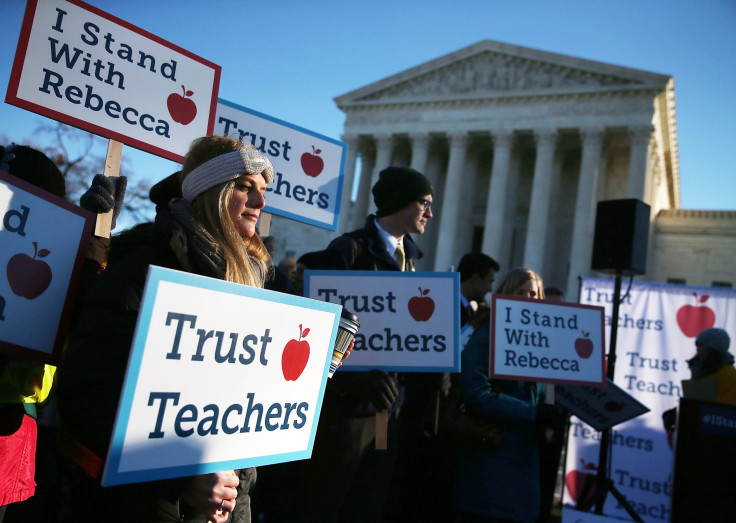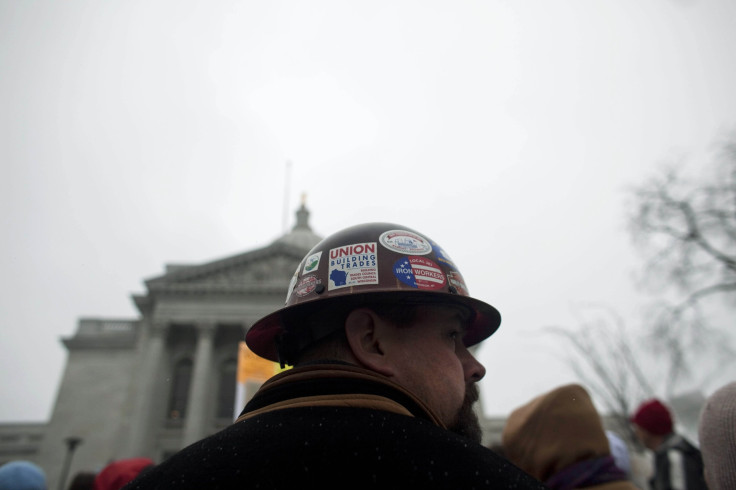Supreme Court Tackles Friedrichs v. California Teachers Association: What’s At Stake For Public-Sector Unions And Workers?

This year, the nation’s high court could deliver another dizzying blow to a movement that’s suffered quite a few of them in recent years. On Monday, the Supreme Court heard oral arguments in the case Friedrichs v. California Teachers Association. At stake is the future of public-sector unions, one of the last bastions of organized labor in the United States. Depending on how the court rules, the implications could extend well beyond the country's 22 million public-sector workers.
What Exactly Is the Court Deciding?
Justices are deciding two issues. The biggest question is whether mandatory fees for public-sector workers violate the First Amendment.
So-called agency fees, also known as fair-share fees, have been a part of labor-management relations for decades. A sanitation worker hired by the city government is not required to join the union at her workplace. But if she decides not to, the union is authorized to deduct fees from her paycheck that go toward bargaining — paying researchers, lawyers and officials, for example, to represent her interests vis-a-vis her employer. Under a Supreme Court ruling from 1977, the union cannot require her to pay for anything that’s unrelated to bargaining — say, lobbying the mayor or funding political campaigns. Such fees, the court found, violate free-speech rights.
The Friedrichs case, brought by Rebecca Friedrichs, a California schoolteacher, argues union fees that go toward bargaining also violate the First Amendment because the question of how governments choose to allocate resources is an inherently political issue.

The court will also examine another closely related matter: whether unions’ current practice of requiring workers to expressly opt out of paying fair-share fees is constitutional, as opposed to having to affirmatively opt in.
What Are the Arguments?
Unions and their allies say fair-share fees are necessary to prevent so-called free-riders. Once a majority of people at a workplace vote for union representation, the union is legally required to represent every employee — not just the ones who wanted it in the first place, or eventually decide to join. Fair-share fees help keep the union afloat, the argument goes. And ultimately, they pay for the benefits that everyone receives from a collective-bargaining agreement — things like higher pay, job security and better working conditions.
Friedrichs and her lawyers argue fair-share fees amount to compelled speech because her employer is the government. In other words, they argue, requiring workers to pay for collective bargaining in the public sector is no different than making them pay for political activities such as lobbying, campaign spending and advertising.
What are the Implications?
An adverse outcome for public-sector unions could severely weaken their bargaining power and broader political influence. Ending mandatory fees would likely immediately affect the nearly 8 million government workers who belong to unions. In the long term, it could weaken the sorts of progressive political initiatives unions are known for.
As Seattle University School of Law Professor Charlotte Garden wrote last year, overturning the precedent on mandatory fees “would set off a wave of contract renegotiations” as unions tried to swallow the costs of free-riding. “This might involve limiting nonessential union activities that benefit both workers and employers, including training programs, peer mentoring and benefits counseling.”
Much of the country already bars unions from charging fees to nonmembers — in the public and private sectors alike. In the 25 states that do so, which are known as “right to work” states, unions tend to have fewer members and less political influence. In 2011, under Gov. Scott Walker, Wisconsin eliminated the ability of public-sector unions to collect mandatory fees from nonmembers. Since then, union membership in the Badger State fell from 14.2 percent of workers in 2010, the year before Walker took office, to 11.7 percent in 2014, the last year of publicly available data.
Union membership has been on the decline for decades across the country, falling to 11.1 percent in 2014. It’s much higher in the public sector, though, which employs about half of the nation’s unionized workforce and where one in three workers belong to a union. If workers had less of an incentive to join unions and pay dues, experts say union density in the public sector could start to more closely resemble the private sector.
A plunge of this sort would likely affect workers across the country. Research has tied the nation’s growing economic inequality and stagnant pay rates to the decline of unions. Critics disagree. They say an end to mandatory fees in the public sector would simply free up much-needed money for cash-strapped governments.
There are political ramifications, too. In recent years, unions have backed initiatives like minimum-wage increases, paid-leave policies, taxes on financial transactions, new safety regulations for construction workers and extending overtime eligibility to millions of workers. They also tend to donate heavily to Democratic politicians: In the 2014 election cycle, for example, the public sector American Federation of State, County and Municipal Employees forked over $11.3 million in contributions, nearly all of it to Democratic candidates or pro-Democratic organizations.
With less money flowing into their coffers, unions presumably would have fewer resources to devote to these sorts of efforts. Bread-and-butter bargaining issues would likely take priority.
A ruling that requires public-sector workers to expressly opt in rather than opt out of paying fair-share fees could have comparable — although significantly less drastic — effects on the ability of unions to raise funds.
How Is the Court Leaning?
Many observers anticipate the court to side with Friedrichs. In a couple of previous rulings — Harris v. Quinn and SEIU v. Knox — the Roberts court appeared to signal its unease with the concept of mandatory fees. Unions, however, may count an unlikely ally in Justice Antonin Scalia.
In the past, Scalia has expressed sympathy for the notion that fair-share fees are a constitutional bulwark against free-riding. In a 1991 case, he wrote: “Where the state imposes upon the union a duty to deliver services, it may permit the union to demand reimbursement for them.”
A decision is expected by this summer.
© Copyright IBTimes 2024. All rights reserved.






















